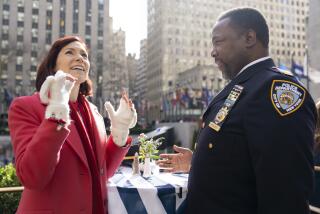TV REVIEWS : ‘Delta’ in Nashville, Cops Clash in ‘Street’
- Share via
Television’s population of leading ladies grows by three tonight with the debut of “Delta” on ABC and “Angel Street” on CBS.
Rebounding from her turbulent last year on “Designing Women,” Delta Burke proves that she has the goods to carry a comedy series by herself. Unfortunately, the one she’s carrying, “Delta,” is not much of a load.
It sails in at 9:30 tonight on Channels 7, 3, 10 and 42, returning at 8 p.m. Thursday, its regular time period.
This is a series about a mature woman belatedly coming of age. The opening credits show Burke, freed from the tyranny of her marriage, elatedly driving an open convertible a la “Thelma & Louise.”
As aspiring country singer-songwriter Delta Bishop, Burke is a pushy blond who leaves her insensitive husband, Charlie, and her job as a beautician for a new life in Nashville, hoping to someday sing in the Grand Old Opry like her idol, Patsy Cline.
Laconic tavern owner Darden Towe (Earl Holliman) hires her as a waitress and even lets her sing on “amateur night.” But who should show up that evening but that blockhead Charlie (Kevin Scannell), who displays his usual Homer Simpson form in an attempt to woo her back home: “Just because I think your dreams are stupid doesn’t mean I don’t respect you.” No sale.
The premiere of “Delta” itself is a tough sale as it substitutes energy and “good ol’ girl” talk for wit. Thursday’s second episode is funnier, giving Burke more of an opportunity to showcase her good comedic skills. Her country-talking character’s relentless attempts to persuade a big-time record producer to give her a shot is sort of a lower-case version of Lucy Ricardo’s marriage-long campaign to persuade Ricky to let her perform in his club.
“Delta” is distinctive, but not enough yet to lift it much above the crowd. It needs a more sharply drawn sense of humor. When Delta Bishop says she wants to emulate Patsy Cline, she must be referring to her jokes.
The CBS drama “Angel Street” reads on paper like a zillion other cop stories on TV:
Two seemingly incompatible homicide detectives from different backgrounds are forced into a partnership that neither wants, and it’s hatred at first sight. Yet “gradually, but grudgingly,” they become allies.
In the interesting but convoluted and bloated two-hour premiere of “Angel Street,” however, the premise plays somewhat differently, capturing your attention with its candor about racial and gender tensions. And, oh yes, in a sort of integrated “Cagney & Lacey,” the clashing cops of “Angel Street” are female, one an upscale African-American, the other a working-class Polish-American.
“Angel Street” premieres at 9 tonight on Channels 2 and 8 and will air at 10 p.m. Saturdays starting Sept. 26.
It gives you Robin Givens as cultured, ambitious Anita King, who is sleeping with the deputy mayor, and Pamela Gidley as coarse-talking Dorothy Paretsky. The squad room in which these reluctant new partners operate is a zoo where a veteran male detective repeatedly harasses Paretsky and where whites label King an “affirmative-action baby.”
Meanwhile, Paretsky tells King that her Polish father “doesn’t like coloreds in the house,” and out on the mean streets, where King is called “nigger” and Paretsky a “dyke,” both women encounter a cynical, distrusting populace that regards police as enemies. The depiction is rare for a TV genre almost always more concerned with capturing crooks than the moods and attitudes of the people.
These expressions of bristling raw anger--seemingly drawn from the headlines of today’s newscasts and newspapers--keep you pinned to the set despite a murky, meandering plot that finds King and Paretsky searching for a missing child, investigating a murder and uncovering a police coverup.
More to Read
The complete guide to home viewing
Get Screen Gab for everything about the TV shows and streaming movies everyone’s talking about.
You may occasionally receive promotional content from the Los Angeles Times.






